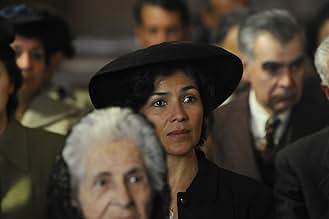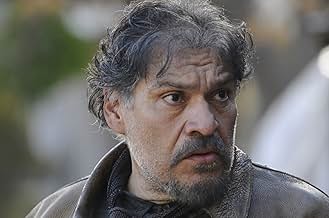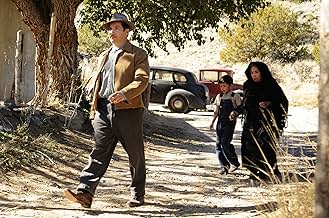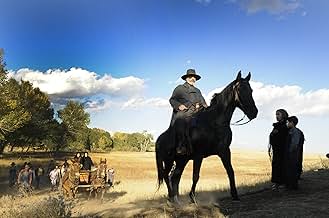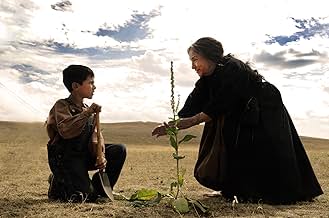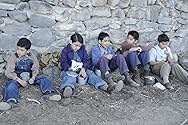IMDb RATING
6.4/10
1.6K
YOUR RATING
A drama set in New Mexico during WWII, centered on the relationship between a young man and an elderly medicine woman who helps him contend with the battle between good and evil that rages i... Read allA drama set in New Mexico during WWII, centered on the relationship between a young man and an elderly medicine woman who helps him contend with the battle between good and evil that rages in his village.A drama set in New Mexico during WWII, centered on the relationship between a young man and an elderly medicine woman who helps him contend with the battle between good and evil that rages in his village.
- Awards
- 3 wins total
Miguel Gomez
- Eugene
- (as Miguel Gómez)
Alex Cacho
- Leon
- (as Alejandro Cabrera)
Diego Miró
- Florence
- (as Diego Miró-Rivera)
- Director
- Writers
- All cast & crew
- Production, box office & more at IMDbPro
Featured reviews
Best movie about our gente since Salt of the Earth. Must watch! No clichés here. Just a sweet, subtle, and poignant coming of age story set in the beautiful, but troubled post WWII landscape of northern New Mexico. Few films make you feel like you're reading a novel-- refreshingly, this one does justice to Rudolfo Anaya's timeless classic. The arc climaxes with little fanfare, but you will no doubt be left with a sense of how and why the supernatural, deeply woven into the daily life of these comunidades, helps people navigate the paradoxes of "good" and "evil." In a period when Latinos, as a demographic are coming of age politically, and while at once courted and loathed, Bless Me, Ultima is timely, but also transcendent and universal. Don't miss it!
I like the way that in the book for Bless Me, Ultima they really show dichotomy between Antonio's Mom and Dad. Maria wanting Antonio to follow his Luna blood line and Gabriel wanting him to follow his Marez blood. In the book it really show how much conflict there is in his mind of who he wants to become and what he wants to be. However, in the movie I really liked how they showed how Maria and Gabriel still love each other very much no matter what their differences are. In the book they didn't show the love between Maria and Gabriel as well as in the movie.
Watching the movie really helped me imagine what Antonio was going through and his emotions. They did a great job of making this movie and show the conflicts in Antonio's life when he was young. I do recommend this movie for those who have read the book.
Watching the movie really helped me imagine what Antonio was going through and his emotions. They did a great job of making this movie and show the conflicts in Antonio's life when he was young. I do recommend this movie for those who have read the book.
Bless Me, Ultima Both the movie and the book expressed a wide view of different moods, details, and analysis. The book took the story one step at a time as the author, Rudolfo Anaya, progressively showed how the main character Antonio developed along with the conflicts of the novel. The book was good with a very detailed insight that made you feel as if you were a part of the book. The movie emphasized the major influences on Antonio as he becomes the age where you decide who and what you are going to be as an adult. The movie was pretty fast paced to fit the whole plot of the book into film, but it did not include the golden carp like it did in the book. This gave Antonio another religion to think about and I think this was very important to the book and the movie did not include it. Also, I like how the book goes into extreme detail to give you a perfect idea to how the story is meant to be portrayed. I liked to see each of the ways that Bless Me Ultima is expressed, but overall, the movie and the book was good.
Having grown up in an environment similar to that which author Anaya describes and the movie attempts to portray, I was both elated and disappointed by the movie. Home base for me was the northern Rio Grande Valley, not the eastern N.M. *llanos* of Anaya's boyhood. I was about 7 years younger than 'tonio in the movie, so my experiences date from about 1951 forward. Things were still quite similar in N.M. back then to the earlier era that Anaya wrote about.
Of all the actors in the movie, the only one who came close to capturing a NM accent and cadence was 'tonio's father. All the others performed well, but to me they did not come across like born and bred New Mexicans. Actors pick up local accents and manners of speech all the time, but nearly all of the Hispanic actors in "Ultima" failed. It's like casting a native Baltimorean as a native of Maine--it stretches credibility. Both speak the language, but anyone from the northeast U.S. would hear the disconnect immediately.
"Bless Me Ultima" is a great story. Similar to Anaya'a family, we moved to Barelas in Albuquerque when I was in 7th grade. We rural New Mexicans of that era have all heard the *bruja* stories and are familiar with *curandera* practices. Ultimately those accounts were stories--told on late evenings when imaginations ran wild. Certainly the three sister witches in the movie added a sense of the spookiness and otherworldliness with which we all grew up, but that conceit only tangentially "gives readers a sense of the influence of indigenous cultural ways that are both authentic and distinct from the mainstream" as the book's entry in Wikipedia says.
Of all the actors in the movie, the only one who came close to capturing a NM accent and cadence was 'tonio's father. All the others performed well, but to me they did not come across like born and bred New Mexicans. Actors pick up local accents and manners of speech all the time, but nearly all of the Hispanic actors in "Ultima" failed. It's like casting a native Baltimorean as a native of Maine--it stretches credibility. Both speak the language, but anyone from the northeast U.S. would hear the disconnect immediately.
"Bless Me Ultima" is a great story. Similar to Anaya'a family, we moved to Barelas in Albuquerque when I was in 7th grade. We rural New Mexicans of that era have all heard the *bruja* stories and are familiar with *curandera* practices. Ultimately those accounts were stories--told on late evenings when imaginations ran wild. Certainly the three sister witches in the movie added a sense of the spookiness and otherworldliness with which we all grew up, but that conceit only tangentially "gives readers a sense of the influence of indigenous cultural ways that are both authentic and distinct from the mainstream" as the book's entry in Wikipedia says.
A touching, unpretentious story told by a man who reminisces about growing up in a Mexican/American family during the years of WWII in New Mexico. The story focuses on the culture that surrounded such families during that time and depicts the strong bonds that tied them to the land, religion and each other. We are shown small glimpses of how even in their remote part the United States, the war had touched them by taking away their sons to defend our country. The storyline mainly surrounds the accounts of this grown up man (Antonio) as he narrates his view of the world as a child and the huge desire he had to understand everything around him. It depicts the very close bond he forms with a new member of their family and how this person shows him the beauty that life has to offer. This new member is named Ultima and she is a healer (curandera) who cures with herbs and "magic". Ultima is taken in by his parents due to her having nobody else in the late stages of her life.
The story shows the importance that religion played in the Mexican culture and how the taboo of the unknown was shunned by most. Ultima's ability to heal people was not always seen by others as good and the accusations of her being a witch are part of the drama within the story. The toil of daily life and the importance of everyone working together during harvest time reveals the close ties that existed between families at that time. Overall, it is a story that shows how people can get strength from their experiences and grow from the wonders that surround them. If we embrace life and everything that happens, both good and evil, we can have an existence with richer fullness.
The story shows the importance that religion played in the Mexican culture and how the taboo of the unknown was shunned by most. Ultima's ability to heal people was not always seen by others as good and the accusations of her being a witch are part of the drama within the story. The toil of daily life and the importance of everyone working together during harvest time reveals the close ties that existed between families at that time. Overall, it is a story that shows how people can get strength from their experiences and grow from the wonders that surround them. If we embrace life and everything that happens, both good and evil, we can have an existence with richer fullness.
Did you know
- TriviaAuthor of the original novel Rudolfo Anaya was a frequent visitor to the set and was treated like royalty by cast and crew, because a majority of both were natives of New Mexico and grew up on the novel.
- ConnectionsFeatured in Maltin on Movies: Jack the Giant Slayer (2013)
- SoundtracksMal Hombre
(uncredited)
Written by Lydia Mendoza
Performed by Lydia Mendoza
Published by San Antonio Music Publishers, Inc.
- How long is Bless Me, Ultima?Powered by Alexa
Details
- Release date
- Country of origin
- Official sites
- Languages
- Also known as
- Bendíceme, última
- Filming locations
- Production companies
- See more company credits at IMDbPro
Box office
- Gross US & Canada
- $1,561,962
- Opening weekend US & Canada
- $470,109
- Feb 24, 2013
- Gross worldwide
- $1,561,962
Contribute to this page
Suggest an edit or add missing content







